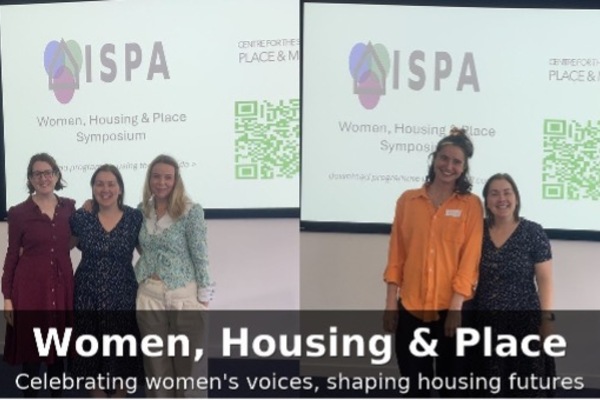
HSA committee member, Jenny Hoolachan, recently attended the University of Salford’s Homelessness Conference 2017: Solutions to the Housing Crisis’. Here, she reflects on the key themes of the day.
Two days before a general election, this conference provided a timely opportunity for delegates to consider the kinds of policies and practices that can help achieve meaningful change for those experiencing or at risk of homelessness. In opening this conference, the Chair (Councillor Paul Longshaw, Salford City Council) asked “why do we allow ourselves to tolerate social injustice and inequalities? Why do we allow the conditions to exist where people have nowhere to call ‘home’?”. This question of social justice framed the varied range of presentations across the day, all of which reflected on the recently passed Homelessness Reduction Act 2017 in England which, similar to the Housing (Wales) Act 2014, establishes prevention of homelessness as a statutory duty on local authorities. More broadly, the conference was also an opportunity to consider the nature of the ‘housing crisis’ that we have heard so much about.
Chris Hancock (Crisis UK) kicked off the presentations by explaining that the origins of the Act were rooted in the finding that large numbers of people approaching their local authorities for housing assistance were being turned away with no help. The preventative nature of the Housing Options approach, therefore, needs statutory status, which is what the Act does. Yet, given that Housing Options requires a coordinated effort among multiple agencies, Chris noted that an early proposal of there being a ‘duty to cooperate’ as a means of implementing effective and meaningful partnership work was rejected from the Bill in favour of a more diluted ‘duty to refer’.
Chris, along with Mike Wright (Greater Manchester Public Service Reform Team) and Lee Sugden (Salix Homes) all noted another highly significant challenge facing the housing sector – that of the Shared Accommodation Rate for under-35s. All three speakers indicated a move towards providing shared housing for young people, with Mike stating that this will become a main housing option for young people facing homelessness. As the Chief Executive of a Housing Association, Lee expressed enthusiasm for delivering a model of shared housing for young people as (to use his own words) it will not only meet the objectives of the “commercial mind” of business, but also serve the “social heart” of social housing. Lee argued that the social housing sector can help young people in need of housing and can do so better than the private rented sector. Yet, Chris warned that shared housing for young people should only be viewed as a means of tackling an urgent social problem and not as an endorsement of the welfare reforms that have led to this situation.
Throughout the day there were also discussions about new and creative initiatives and ideas that are being developed to address homelessness. Both Chris and Satty Rai (Northern Housing Consortium) provided examples of ‘trailblazer’ programmes taking place across England. Satty described how Newcastle City Council has tiered ‘primary, secondary, and crisis’ levels of prevention, which help to inform Housing Options staff when supporting those in need. Robert McCartney (Leeds City Council) detailed steps taken in Leeds in rethinking the so called “perverse incentive” whereby individuals can only access social housing if they first move into temporary accommodation. Chris talked about a Housing First initiative in Liverpool, highlighting the crucial importance of mental health support for homeless individuals.
Unsurprisingly, there was a consensus that sufficient resourcing for support services linked to homelessness – health, mental health, substance use, tenancy sustainability, financial advice – is desperately needed. Mental health was also the subject of Nick Maguire’s (University of Southampton) presentation. He unpacked the complex relationships between mental health and homelessness, and argued that mental health should be viewed as an issue that all services can tackle, not just medical specialists and, in particular, that the physical spaces and social relationships in hostels can be altered in ‘psychologically informed’ ways to improve the mental wellbeing of the people living there.
Finally, while we heard a great deal about new ideas, two speakers reminded us not to forget about some of the effective tools that are well established. In discussing the problem of becoming homeless due to being issued a Section 21 notice to end an assured shorthold tenancy in the private rented sector, Ian Loveland (City University of London) explained the critical importance of service providers having sufficient knowledge of housing law to appeal such notices. This is particularly crucial given cuts to Legal Aid. Lastly, Tony Stephenson (Emmaus Bolton) described the work of Emmaus communities throughout the world, which provide both housing and employment for homeless individuals. His contribution sought to highlight the value of social enterprise and the therapeutic benefits of meaningful work.
The Homelessness Reduction Act 2017 is a welcome and long overdue change needed to reform the system and to better tackle homelessness. This conference laid bare, however, many of the wider challenges associated with the housing crisis. In fact, this crisis is not just about housing or about a statutory homelessness system that didn’t (until now) offer meaningful help to some groups. It is also, crucially, about cuts to support services which restrict meaningful and effective partnership work and about welfare reforms which have disproportionately harmed young people and weakened the social safety net that has in the past protected people from homelessness. In this context, Cllr Longshaw was surely right to emphasise in his closing remarks that the housing sector needs to be ready to convince the new government that preventing homelessness and improving the lives of homeless people should be one of its core priorities.







